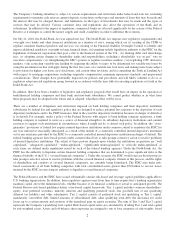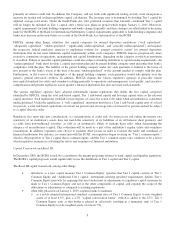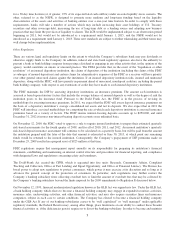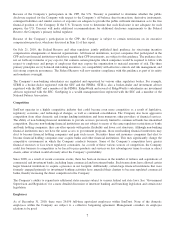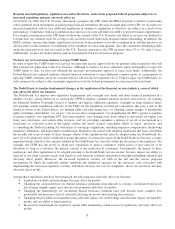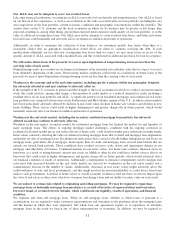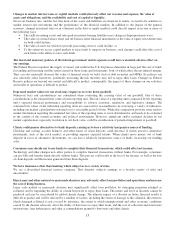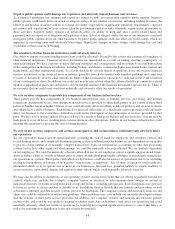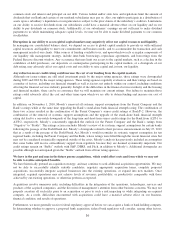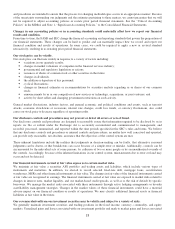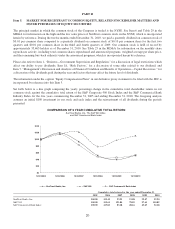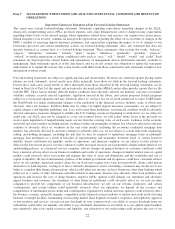SunTrust 2010 Annual Report Download - page 28
Download and view the complete annual report
Please find page 28 of the 2010 SunTrust annual report below. You can navigate through the pages in the report by either clicking on the pages listed below, or by using the keyword search tool below to find specific information within the annual report.repurchase mortgage loans as a result of borrower fraud or in the event of early payment default of the borrower on a
mortgage loan. Likewise, we are required to repurchase or substitute mortgage loans if we breach a representation or
warranty in connection with our securitizations. While in many cases we may have a remedy available against the originating
broker or correspondent, often these may not be as broad as the remedies available to a purchaser of mortgage loans against
us, and we face the further risk that the originating broker or correspondent may not have the financial capacity to satisfy
remedies that otherwise may be available to us. Therefore, if a purchaser enforces its remedies against us, we may not be able
to recover our losses from the originating broker or correspondent. We have received a number of repurchase and indemnity
demands from purchasers. These have resulted in an increase in the amount of losses for repurchases. While we have taken
steps to enhance our underwriting policies and procedures, these steps will not reduce risk associated with loans sold in the
past. If repurchase and indemnity demands increase materially, our results of operations may be adversely affected.
We are subject to risks related to delays in the foreclosure process.
When we originate a mortgage loan, we do so with the expectation that if the borrower defaults then our ultimate loss is
mitigated by the value of the collateral which secures the mortgage loan. Our ability to mitigate our losses on such defaulted
loans depends upon our ability to promptly foreclose upon such collateral after an appropriate cure period. In some states, the
large number of foreclosures which have occurred has resulted in delays in foreclosing. In some instances, our practices or
failures to adhere to our policies has contributed to these delays—refer to “Management’s Discussion and Analysis—
Nonperforming Assets.” Any delay in the foreclosure process will adversely affect us by increasing our expenses related to
carrying such assets, such as taxes, insurance, and other carrying costs, and exposes us to losses as a result of potential
additional declines in the value of such collateral.
Regulators and other law enforcement authorities in certain states and the U.S. Department of Justice and other federal
agencies have stated they are investigating whether mortgage servicers have had irregularities in their foreclosure practices.
Those investigations, as well as any other governmental or regulatory scrutiny of our foreclosure processes, could result in
fines, penalties or other equitable remedies and result in significant legal costs in responding to governmental investigations
and possible litigation. While we cannot predict the ultimate impact of any delay in foreclosure sales, or any issues that may
arise as a result of alleged irregularities with respect to previously completed foreclosure activities, we may be subject to
additional borrower and non-borrower litigation and governmental and regulatory scrutiny related to our past and current
foreclosure activities. This scrutiny may extend beyond our pending foreclosure matters to issues arising out of alleged
irregularities with respect to previously completed foreclosure activities. We expect that our costs will increase modestly in
2011 as a result of the additional resources necessary to perform the foreclosure process assessment, revise affidavit filings
and make any other operational changes. This may result in higher noninterest expense, including higher servicing costs and
legal expenses, in our Mortgage line of business. In addition, process changes required as a result of our assessment could
increase our default servicing costs over the longer term. Finally, the time to complete foreclosure sales temporarily may
increase, and this may result in an increase in nonperforming assets and servicing advances and may impact the collectability
of such advances and the value of our MSR asset. Accordingly, delays in foreclosure sales, including any delays beyond
those currently anticipated, our process enhancements and any issues that may arise out of alleged irregularities in our
foreclosure processes could increase the costs associated with our mortgage operations.
We may continue to suffer increased losses in our loan portfolio despite enhancement of our underwriting policies.
We seek to mitigate risks inherent in our loan portfolio by adhering to specific underwriting practices. These practices often
include the analysis of a borrower’s credit history, financial statements, tax returns and cash flow projections; valuation of
collateral based on reports of independent appraisers; and verification of liquid assets. Although we have taken steps to
enhance our underwriting policies and procedures, we have still incurred high levels of losses on loans that have met these
criteria, and may continue to experience higher than expected losses depending on economic factors and borrower behavior.
As a financial services company, adverse changes in general business or economic conditions could have a material
adverse effect on our financial condition and results of operations.
The continuing weakness or further weakening in business and economic conditions generally or specifically in the principal
markets in which we do business could have one or more of the following adverse impacts on our business:
•A decrease in the demand for loans and other products and services offered by us;
•A decrease in the value of our LHFS or other assets;
•A loss of clients and/or reduced earnings could trigger an impairment of certain intangible assets, such as goodwill;
•An increase in the number of clients and counterparties who become delinquent, file for protection under
bankruptcy laws or default on their loans or other obligations to us. An increase in the number of delinquencies,
bankruptcies or defaults could result in a higher level of nonperforming assets, net charge-offs, provision for credit
losses, and valuation adjustments on LHFS.
12


